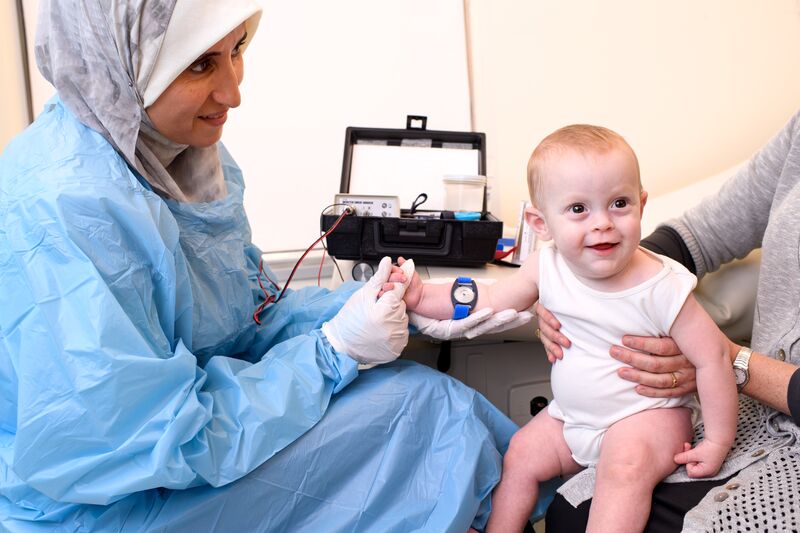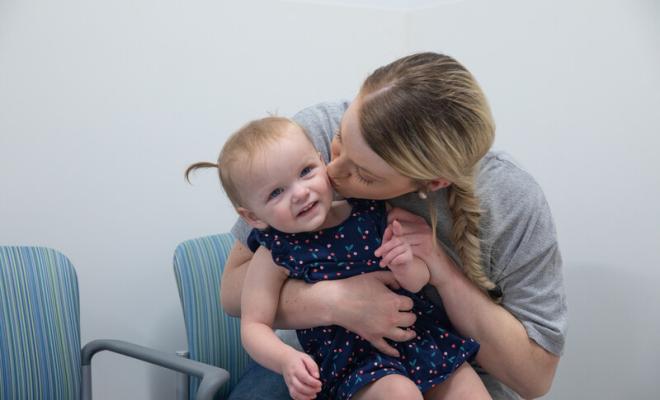CF Diagnosis Clinical Care Guidelines
Farrell PM, White TB, Ren CL, et al. Diagnosis of Cystic Fibrosis: Consensus Guidelines from the Cystic Fibrosis Foundation. J Pediatr. 2017 Feb;181S:S4-S15.e1. doi: 10.1016/j.jpeds.2016.09.064.
Purpose and Background
The diagnosis of cystic fibrosis is based on clinical signs and symptoms consistent with the disease and objective evidence of cystic fibrosis transmembrane conductance regulator (CFTR) dysfunction. As our understanding of CF pathophysiology has evolved, three factors have contributed to a need for refinement of formal diagnostic criteria.
First, the advent of universal newborn screening (NBS) has altered the initial diagnostic scenario for most new patients. Establishing a CF diagnosis for these, often asymptomatic, newborns requires confirmation of the NBS. Second, increased use of CFTR genetic testing and significant progress in our understanding of CFTR variants have allowed CFTR genetic testing to play a greater role in defining disease related to CFTR dysfunction. Finally, there has been increasing recognition of situations in which prior CF diagnostic criteria did not adequately give an answer to whether an individual has CF. The most common example occurs when an infant has a positive newborn screen but does not meet sweat chloride or genetic criteria to confirm the diagnosis.
In the U.S., these asymptomatic newborns were described as having CFTR-related metabolic syndrome (CRMS), whereas a European-led advisory group used the term CF Screen Positive, Inconclusive Diagnosis (CFSPID). Details concerning the diagnostic challenge of CRMS/CFSPID are covered in a separate guidelines statement. Another situation in which CFTR dysfunction contributes to a clinical syndrome without fulfilling the diagnostic criteria of CF is CFTR-related disorder (CFTR-RD).
Methodology
The Cystic Fibrosis Foundation assembled a group of 32 CF diagnosis experts from 10 countries to revise prior diagnostic criteria with specific attention to the above challenges. The discussion generated specific consensus statements voted on by conference participants. The statements that met the threshold of 80 percent agreement were enacted. Those that did not meet the consensus threshold underwent iterative revision. The results were published as six articles in a supplementary issue of the Journal of Pediatrics.
Recommendations
| Recommendations | Evaluation of the Evidence |
| 1. Sweat chloride testing should be performed according to approved procedural guidelines published in established international protocols, such as the Clinical and Laboratory Standards Institute (CLSI) 2009 Guidelines. | Consensus, 100% agreement |
| 2. Newborns with a positive CF newborn screen, to increase the likelihood of collecting an adequate sweat specimen, should have the test performed bilaterally and when the infant weighs >2 kg, and is at least 36 weeks of corrected gestational age. | Consensus, 87% agreement |
| 3. Newborns greater than 36 weeks gestation and >2 kg body weight with a positive CF newborn screen, or positive prenatal genetic test, should have sweat chloride testing performed as soon as possible after 10 days of age, ideally by the end of the neonatal period (4 weeks of age). | Consensus, 93% agreement, 1 abstention |
| 4. In infants with presumptive CF identified through NBS, CF treatment should not be delayed while efforts to establish a CF diagnosis are initiated. | Consensus 83% agreement, 1 abstention |
| 5. Sweat chloride analysis should be performed within a few hours of sweat collection, and the results and interpretations should be reported to clinicians and parents or patients as soon as possible and certainly on the same day. | Consensus, 90% agreement |
| 6. In individuals presenting with a positive newborn screen, clinical features consistent with CF, or a positive family history, a diagnosis of CF can be made if the sweat chloride value is ≥60 mmol/L. | Consensus, 93% agreement |
| 7. Individuals who are screen-positive and meet sweat chloride criteria for CF diagnosis should undergo CFTR genetic testing if the CFTR genotype was not available through the screening process or is incomplete. | Consensus, 100% agreement |
| 8. In individuals with a positive newborn screen, a sweat chloride of <30 mmol/L indicates that CF is unlikely. | Consensus, 82% agreement, 2 abstentions |
| 9. Individuals with clinical features that may be consistent with CF who have a sweat chloride less than 30 mmol/L indicates that CF is less likely. It may however be considered if evolving clinical criteria and/or CFTR genotyping support CF and not an alternative diagnosis. | Consensus, 80% agreement |
| 10. Individuals presenting with a positive newborn screen, symptoms of CF, or a positive family history, and sweat chloride values in the intermediate range (30-59 mmol/L) on two separate occasions, may have CF. They should be considered for extended CFTR gene analysis and/or CFTR functional analysis. | Consensus, 90% agreement |
11. The latest classifications identified in the CFTR2 project should be used to aid with CF diagnosis:
|
Consensus, 100% agreement |
| 12. In individuals presenting with a positive newborn screen, symptoms of CF, or a positive family history, the identification of two CF-causing mutations (defined by CFTR2) is consistent with a diagnosis of CF. Sweat chloride testing is necessary, though, to confirm the diagnosis. | Consensus, 87% agreement |
| 13. The absence of detection of two CF-causing CFTR mutations does not exclude a diagnosis of CF. | Consensus, 93% agreement, 1 abstention |
| 14. If further CF functional testing is needed (nasal potential difference [NPD] and intestinal current measurement [ICM]), it should be performed in a validated reference center with trained staff certified by the CF Foundation Therapeutics Development Network (TDN) or European Cystic Fibrosis Society Clinical Trial Network (CTN). | Consensus, 100% agreement |
| 15. In individuals with a positive newborn screen but variable or uncharacterized CFTR mutations (less than two CF-causing mutations), the diagnosis of CF can be made by demonstrating CFTR dysfunction (a sweat chloride >60 mmol/L or CF-typical NPD or ICM). | Consensus, 93% agreement |
| 16. The term CRMS is used in the U.S. for health care delivery purposes, and CFSPID is used in other countries, but these both describe an inconclusive diagnosis following NBS. | Consensus, 96% agreement, 2 abstentions |
| 17. The term CRMS/CFSPID is reserved for screen-positive individuals without clinical features consistent with a diagnosis of CF. | Consensus, 83% agreement, 1 abstention |
18. The definition of CRMS/CFSPID is an infant with a positive NBS test for CF and either:
|
Consensus, 86% agreement, 1 abstention |
| 19. Children designated as CRMS/CFSPID should undergo at least one repeat sweat chloride test at CF centers with suitable expertise, such as an accredited CF center. | Consensus, 86% agreement, 1 abstention |
| 20. Children designated as CRMS/CFSPID should have a clinical evaluation performed by CF providers to identify the minority that may develop clinical symptoms. | Consensus, 83% agreement, 1 abstention |
| 21. Children designated as CRMS/CFSPID can be considered for extended CFTR gene analysis (sequencing and or deletion duplication testing), as well as CFTR functional analysis (NPD/ICM) testing to further define their likelihood of developing CF. | Consensus, 80% agreement |
| 22. The decision to reclassify children designated as CRMS/CFSPID as CF is an integrated decision that should take into account functional assessment of CFTR (sweat chloride, and possibly NPD/ICM), CFTR genetic analysis, and clinical assessment by the CF clinicians caring for the patient. | Consensus, 90% agreement |
| 23. Genetic counseling should be offered to families of individuals followed for CRMS/CFSPID, including a discussion of the risk in future pregnancies. | Consensus, 100% agreement, 1 abstention |
| 24. Research recommendation: Infants with a designation of CRMS/CFSPID (by definition) do not have clinical features consistent with a diagnosis of CF and further research is needed to determine the prognosis and best practices for frequency and duration of follow up. | Consensus, 96% agreement |
| 25. For individuals presenting with CF symptoms, the same diagnostic criteria recommended for the screened population for sweat chloride testing, CFTR genetic analysis, and CFTR functional testing should be used to confirm a CF diagnosis. | Consensus, 95% agreement |
| 26. The diagnosis of CFTR-related disorder has been defined as a monosymptomatic clinical entity (CBAVD/pancreatitis/bronchiectasis) associated with CFTR dysfunction that does not fulfill the diagnostic criteria for CF. | Consensus, 86% agreement, 2 abstentions |
| 27. Clinicians should avoid the use of terms like classic/nonclassic CF, typical/atypical CF, delayed CF, since these terms have no harmonized definition and could be confusing for families or caregivers. | Consensus, 83% agreement, 1 abstention |
Unanswered Questions
- Outcomes for newborns diagnosed as CRMS/CFSPID are largely unknown to CF clinicians. Currently there are no long-term data on the probability of disease development or how to best identify those who may progress to a CF diagnosis. There is no consensus for follow up or monitoring of these asymptomatic individuals.
- Those that present with an isolated finding of bronchiectasis, sinus disease, or pancreatitis require careful clinical evaluation because the differential is broad. If the CF diagnosis is inconclusive, diagnosing CFTR-RD requires interpretation by a clinician knowledgeable of indeterminate sweat chloride and/or genetic testing. The pre-test suspicion of a CFTR dysfunction as the primary cause of symptoms must also be part of diagnostic decision-making.
- Nasal potential difference and intestinal current measurements (outside of a research setting) is less utilized in the U.S. than in Europe. When standard protocols have been established for these techniques and use in diagnosis is studied, their role will be better elucidated.
Further Reading
Relevant manuscripts published after the original guidelines are listed below. These manuscripts have not been reviewed or endorsed by the guidelines committee.
- Farrell P, White T. Introduction to Cystic Fibrosis Foundation Consensus Guidelines for Diagnosis of Cystic Fibrosis. J Pediatr. 2017 Feb S1-3. doi: 10.1016/j.jpeds.2016.09.062.
- Farrell P, White T, Deriches N, Sastellani C, Rosenstein B. Cystic Fibrosis Diagnostic Challenges over 4 Decades: Historical Perspectives and Lessons Learned. J Pediatr. 2017 Feb;181S:S16-S26. doi: 10.1016/j.jpeds.2016.09.067.
- Sosnay P, Salinas D, White T, et al. Applying Cystic Fibrosis Transmembrane Conductance Regulator Genetics and CFTR2 Data to Facilitate Diagnosis. J Pediatr. 2017 Feb S27-32.e1. doi: 10.1016/j.jpeds.2016.09.063.
- Farrell P, White T, Howenstine M, et al. Diagnosis of Cystic Fibrosis in Screened Populations. J Pediatr. 2017 Feb S33-44e.2. doi: 10.1016/j.jpeds.2016.09.065.
- Ren C, Borowitz D, Gonska T, et al. Cystic Fibrosis Transmembrane Conductance Regulator-Related Metabolic Syndrome and Cystic Fibrosis Screen Positive, Inconclusive Diagnosis. J Pediatr. 2017 Feb S45-51.e1. doi: 10.1016/j.jpeds.2016.09.066.
- Sosnay P, White T, Farrell P, et al. Diagnosis of Cystic Fibrosis in Nonscreened Populations. J Pediatr. 2017 Feb S52-57.e2. doi: 10.1016/j.jpeds.2016.09.068.
Use of These Guidelines
The CF Foundation intends for this executive summary of its guideline to summarize the published guideline. The published guideline summarizes evidence, and provides reasonable clinical recommendations based on that evidence, to clinicians, patients, and other stakeholders. Care decisions regarding individual patients should be made using a combination of these recommendations, the associated benefit-risk assessment of treatment options from the clinical team, the patient's individual and unique circumstances, as well as the goals and preferences of the patients and families that the team serves, as a part of shared decision-making between the patient and clinician.
This executive summary was prepared by:
Claire Keating, MD, (Columbia University); Sherstin T Lommatzsch, MD, (National Jewish Health); and Patrick Sosnay, MD, (Johns Hopkins University)
The guidelines were published in February 2017, they were reviewed in July 2021 and it was determined that no update is needed at this time.


